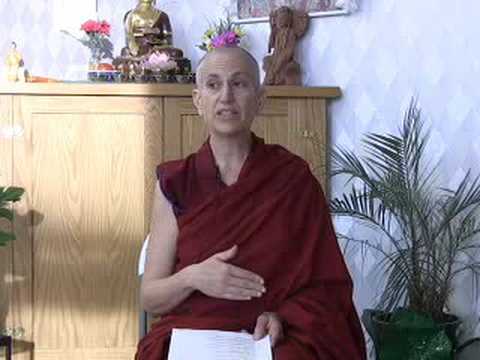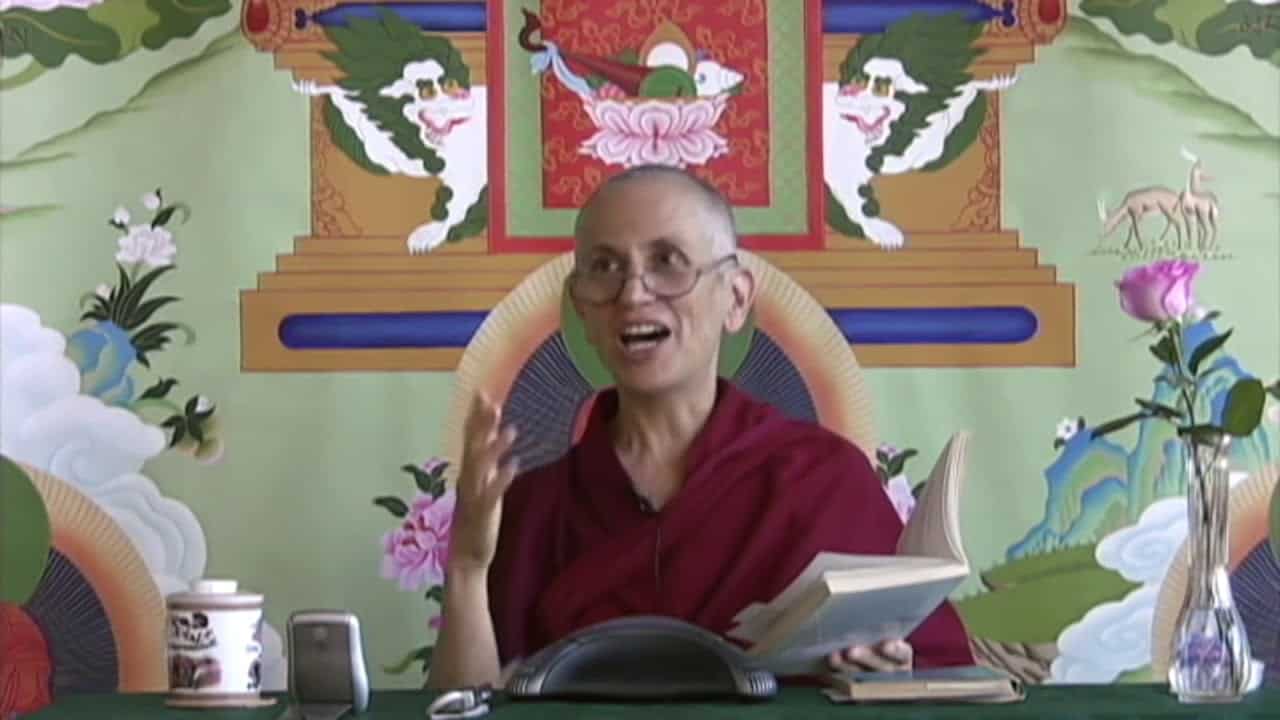Verse 15-2: Three kinds of bodhisattvas
Part of a series of talks on the 41 Prayers to Cultivate Bodhicitta from the Avatamsaka Sutra (the Flower Ornament Sutra).
- Three kinds of bodhisattvas
- “Parent-like,” “bus driver” type, “presidential-like”
41 Prayers to cultivate bodhicitta: Verse 15-2 (download)
Yesterday the question came up when we were talking about the different kinds of bodhisattva, because we were talking about:
“May I plunge into cyclic existence for the sake of all beings.”
This is the prayer of the bodhisattva when going down a staircase.
was talking about how bodhisattvas want to attain enlightenment for the benefit of others and how sometimes there’s this misconception that they don’t, because they want to stay in samsara in order to benefit sentient beings. Then the question came up,”But in the teachings they often talked about three kinds of bodhisattvas.” The three kinds, the first one is the shepherd-like bodhisattva, and then the oarsman-type of bodhisattva, and then the king-like bodhisattva. So it’s said this is how some people generate bodhicitta.
The first one, the shepherd-like bodhisattva: when the shepherd goes, the sheep go in front. This is the bodhisattva that says, “Ok, I’m giving up my own enlightenment, and everybody else gets enlightened, then I get enlightened.” This seems to contradict what I said yesterday.
Then there’s the oarsman-type of bodhisattva, because he’s in the same vehicle so they arrive at enlightenment at the same time.
And then there’s the king-like bodhisattva: the king usually goes first, then everybody else follows in the entourage. That bodhisattva attains enlightenment first and then leads everybody else there.
They give these three examples and they say that actually the king-like bodhisattva’s the one of the highest faculties, because they realized that actually it’s more important to attain enlightenment for the benefit of others then to stay in samsara and not be able to help anybody as well as you could if you were already a buddha. They said that actually all bodhisattvas eventually get around to being king-like bodhisattvas and attain enlightenment for the benefit of sentient beings.
When I was thinking about these three examples, I was thinking that some of them may not fit so well with our culture, so was adjusting them. The shepherd-like bodhisattva…. I don’t know if any of you have ever seen a shepherd with sheep, maybe not. In India you do, but if you live in a city in America you don’t. But, what you see is at a cafeteria, a mother with her kids in front or a dad with the kids in front. That’s the same idea, you put the kids in front. If you’re getting on a plane with a bunch of young kids, the kids go in front, the mom or dad goes behind and you’re leading them there, you’re guiding them there. You get them all settled and then you settle down. That could be one kind of bodhisattva who initially thinks like that, but then realizes that it’s actually better to attain enlightenment first and then have more capabilities to lead others.
Then the oarsman-kind of bodhisattva. Again I don’t know how many of you have seen oarsman, but we’ve all ridden on buses. So, the bus driver type of bodhisattva, where the bus driver gets there the same time as the passengers.
And then the king-like bodhisattva. We should probably say the presidential bodhisattva, except actually it isn’t like the president goes first, because actually all the security guards go first and last and all around. But you know, we can fudge there a little bit. I think with the king-like bodhisattva, the idea is, you have this tremendous self-confidence of, “I’m going to attain enlightenment and lead all beings there.” Really, to practice the bodhisattva path, you need to have tremendous self-confidence. And that sense of “I” that you practice the bodhisattva path with, is not the egotistical sense of “I.” We shouldn’t get confused here.
Of course if you’re going “I want to be a bodhisattva, I want to be a buddha, because then people will give me a pear and some almonds.” If you’re thinking like that, you definitely have some self-grasping and some ego problems. And if you’re giving up enlightenment in order to get a pear and some almonds, you really have the wrong view. But you have to have this great self-confidence to be able to practice the path and really work for the benefit of others.
Bodhisattvas…. Sometimes we think they’re full of love and compassion so they’re so meek and sweet like this. Actually bodhisattvas have so much energy, because they’ve got to accomplish the path and there are all these sentient beings who’re doing who knows what, that they are trying to benefit, who aren’t listening to them at all. Bodhisattvas are dragging us to enlightenment and we’re fighting them, kicking and screaming. And so they have to have tremendous energy and tremendous self-confidence. That sense of “I,” that kind of self-confidence, that’s not ego grasping.
Don’t think that when you have love and compassion you’re just like really sweet and everybody walks over you, it’s not like that. You’re really strong and can do a lot to benefit. Similarly, we should have great self-confidence when we’re practicing the path. And not just think, “Oh I’m little old me, I’m not worthy of enlightenment.” That’s rubbish.
Venerable Thubten Chodron
Venerable Chodron emphasizes the practical application of Buddha’s teachings in our daily lives and is especially skilled at explaining them in ways easily understood and practiced by Westerners. She is well known for her warm, humorous, and lucid teachings. She was ordained as a Buddhist nun in 1977 by Kyabje Ling Rinpoche in Dharamsala, India, and in 1986 she received bhikshuni (full) ordination in Taiwan. Read her full bio.


